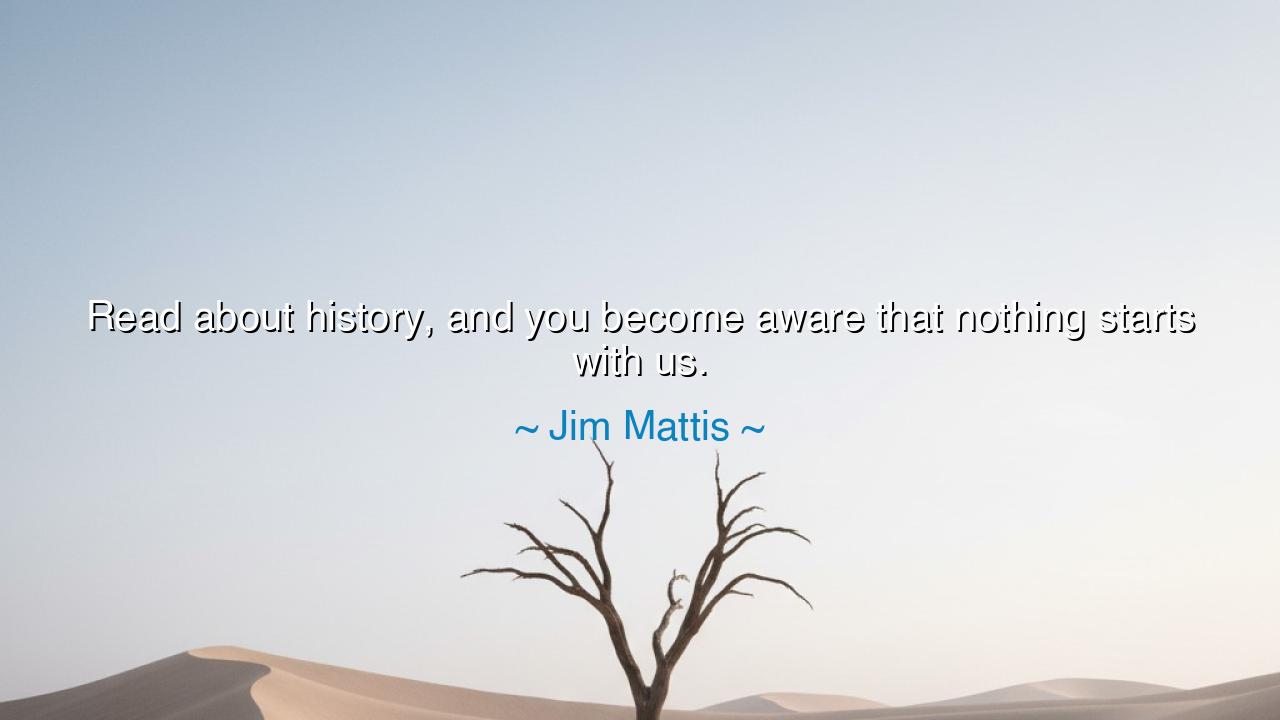
Read about history, and you become aware that nothing starts with






“Read about history, and you become aware that nothing starts with us.” — Thus spoke Jim Mattis, the soldier-philosopher, whose mind was tempered not only by war but by wisdom. His words strike like a steady drumbeat in the halls of human pride, reminding us that we are not the first to struggle, to triumph, or to dream. In this single sentence lies both humility and enlightenment — for to read history is to awaken from the illusion of novelty, to see that every challenge, every conflict, every act of courage or folly is but a verse in the long and unbroken song of mankind.
To say that nothing starts with us is not to diminish our worth, but to place us within the great tapestry of time. Every age believes itself unique, every generation convinced that its trials are without precedent — yet the pages of history whisper otherwise. Nations have risen before, nations have fallen. Empires have conquered and decayed, revolutions have burned bright and then dimmed. Love, betrayal, faith, ambition — these are not the inventions of today but the eternal companions of humanity. Mattis, a man who has led through the fog of war, reminds us that wisdom is born of memory, and that to know the past is to walk more wisely into the future.
Consider the example of Pericles of Athens, who, in the golden age of Greece, stood before his people and declared that the city’s greatness lay not in its wealth, but in its spirit. He believed Athens to be eternal — yet within a generation, it was humbled by the Peloponnesian War. Centuries later, Rome would follow the same arc: pride, conquest, excess, and decline. And still later, Europe would repeat it again. The cycle endured because men forgot what their forebears had already learned. They believed themselves different, untouched by the same forces of greed and arrogance. But history, patient and merciless, teaches the same lesson to all who refuse to read her scrolls.
Mattis’s words are the antidote to such arrogance. When he says, “Read about history,” he speaks not as a scholar, but as a guardian of experience. He has seen firsthand the cost of ignorance — soldiers who think bravery alone wins wars, leaders who mistake passion for strategy, nations who rush into folly believing they are wiser than those who came before. Yet those who study the past see its patterns: how uncertainty breeds fear, how fear breeds tyranny, and how only humility and learning can save a civilization from itself. The wise know that though our weapons change, the human heart does not — and thus, the lessons of yesterday are still the map of tomorrow.
There is a profound humility in understanding that nothing begins with us. It frees us from vanity and connects us to something greater — the continuum of human striving. When we read of the builders of the pyramids, the thinkers of Athens, the explorers who sailed into the unknown, we realize that we walk paths paved by their courage. Our inventions, our governments, our philosophies — all are born from the labor of countless minds and hands before us. We are heirs, not creators ex nihilo. We inherit both the wisdom and the mistakes of our ancestors. To deny this is to cut ourselves off from the roots that nourish us.
Think of Abraham Lincoln, who during the darkest days of the American Civil War turned to the words of the Bible and the wisdom of the Founding Fathers. He did not claim to invent freedom; he sought to preserve and expand it. In the quiet hours of night, he read the histories of Rome, of Greece, and of fallen nations, seeking guidance in the stories of others. That is the mark of true leadership — not to believe oneself as the first, but to recognize oneself as a steward of a legacy, a link in the endless chain of history.
Let this be your lesson: Read. Reflect. Remember. When you face hardship, know that others have faced worse and prevailed. When you are tempted by pride, remember that empires greater than yours have crumbled. When you seek wisdom, seek it not in novelty but in the memory of mankind. History is not a relic — it is a living teacher, ever waiting for those humble enough to listen.
So walk through this world with awareness. Know that your hands build upon foundations laid by generations unseen. You are not the beginning — but you may become part of something that endures beyond you. For as Jim Mattis reminds us, “nothing starts with us” — and in that truth lies not limitation, but liberation. To know your place in the story of time is to live with purpose, gratitude, and reverence — as both the student of the past and the author of the future.






AAdministratorAdministrator
Welcome, honored guests. Please leave a comment, we will respond soon